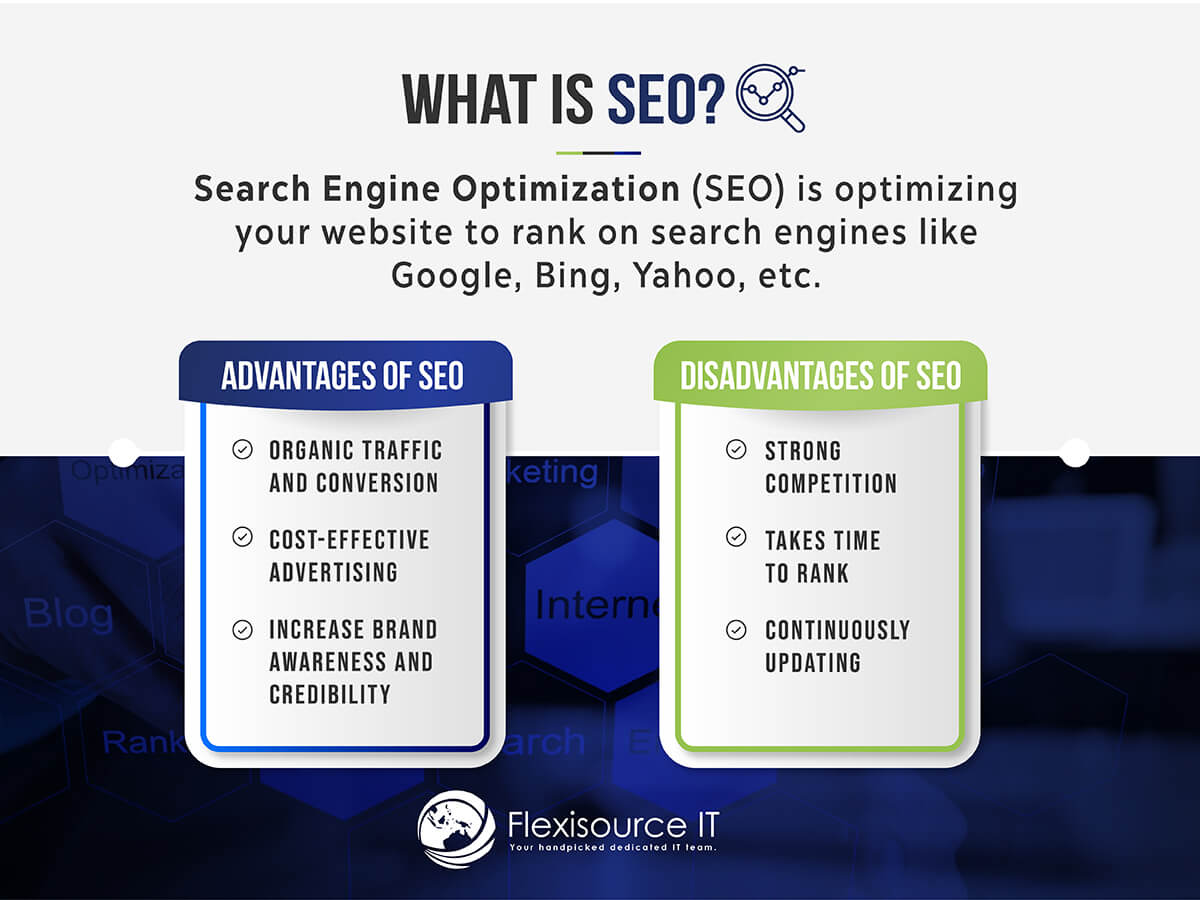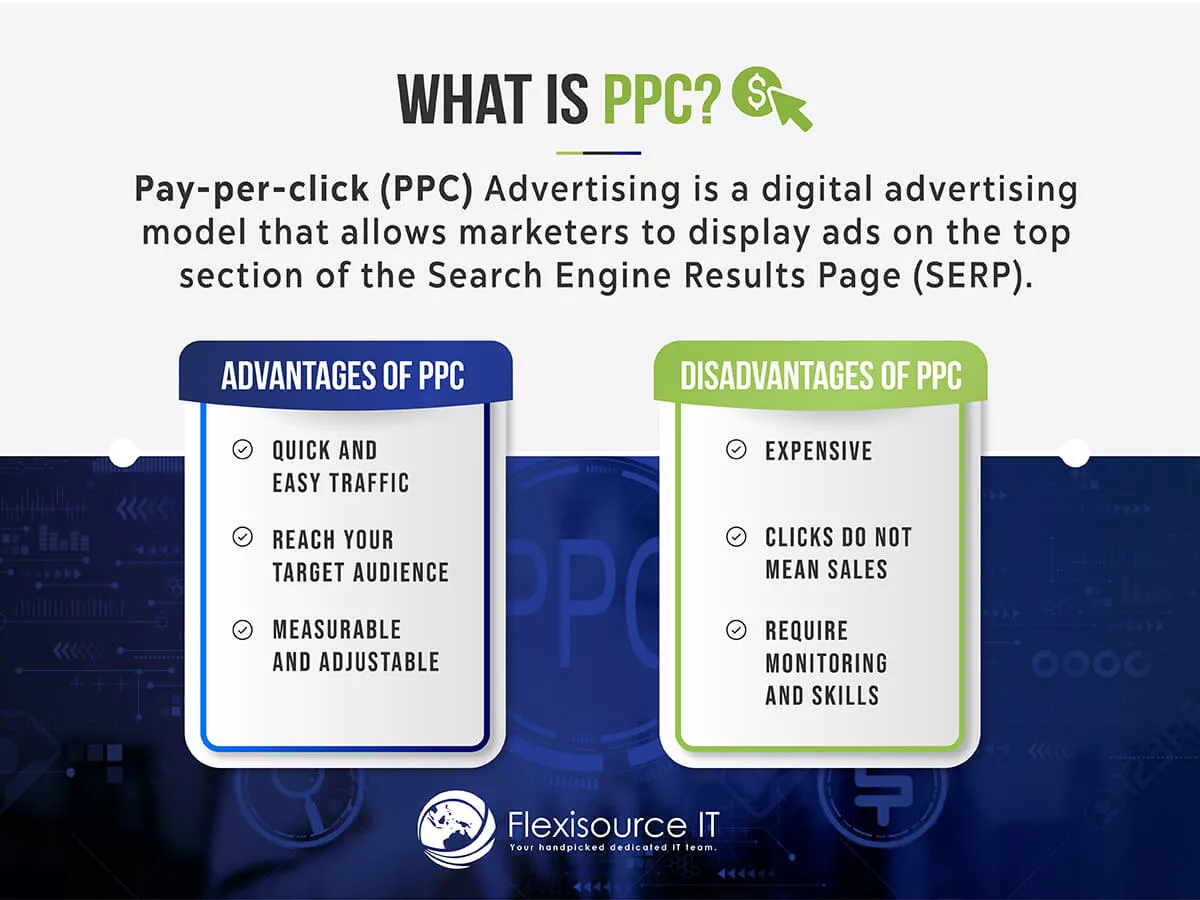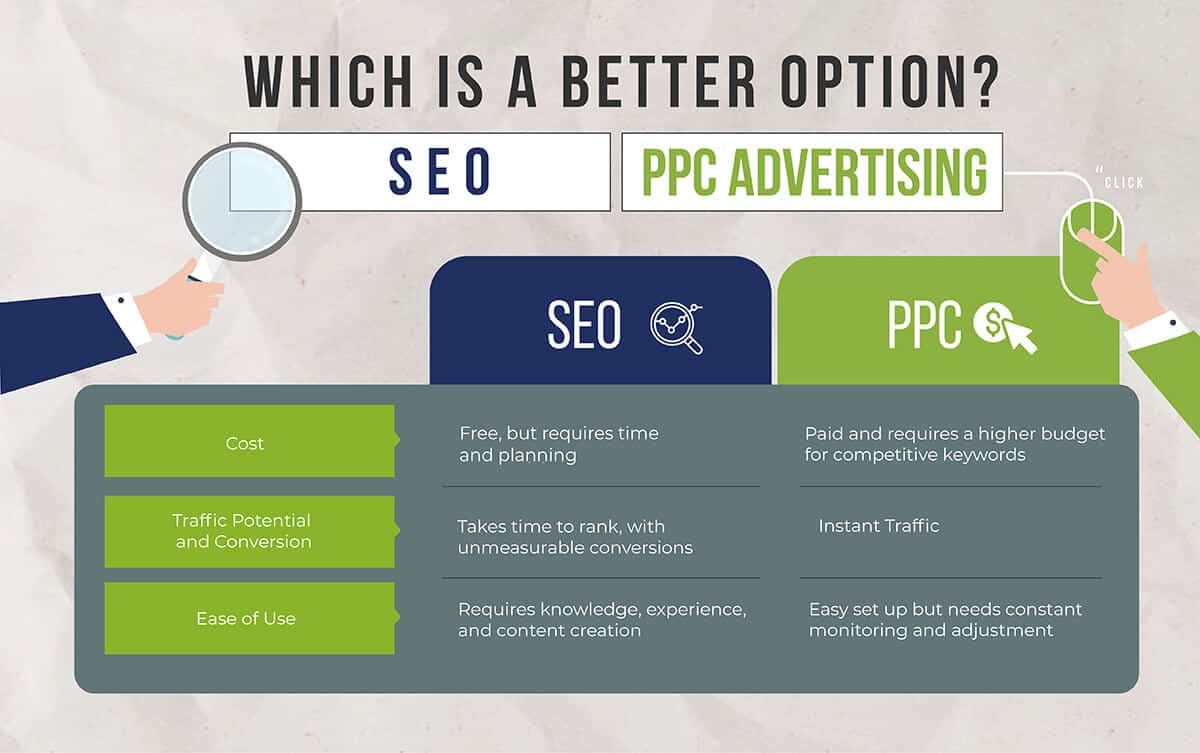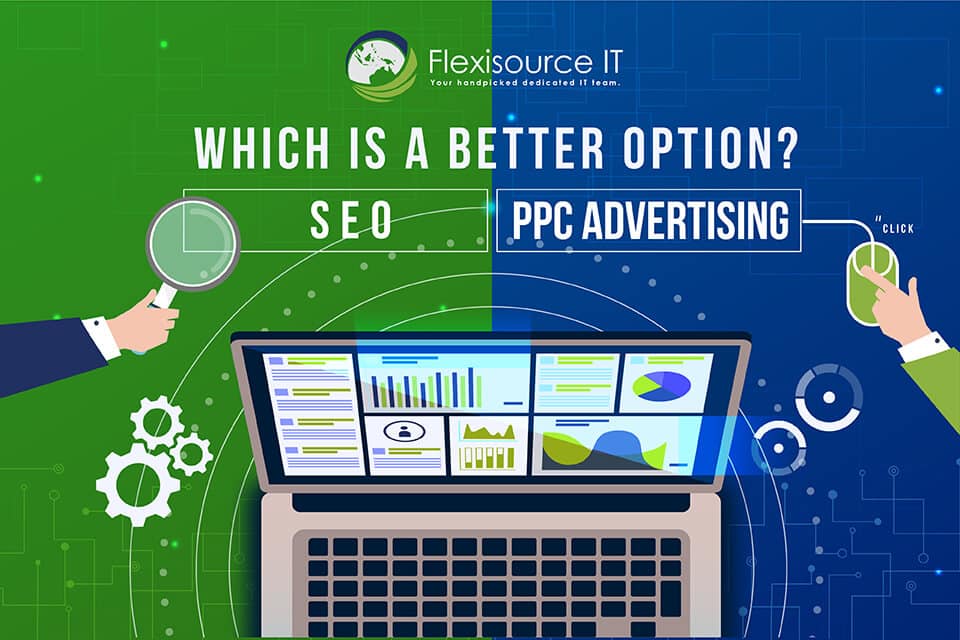The vast majority of marketing today is happening online with the rise of the digital age in our lives. Most people spend their time more online than outside. Digital and content marketing to social media management is a significant potential for many businesses to help their company thrive.
When starting your digital marketing venture, it’s essential to recognize its definition, benefits, and drawbacks. Many marketers have used different options. However, two specific areas in digital marketing, search engine optimization (SEO) and pay-per-click (PPC) advertising, are a hit in the digital marketing scheme.
This article will tackle SEO and PPC differences, pros, cons, and more.
What is SEO?
Search Engine Optimization (SEO) is a method of enhancing and optimizing your website and pages to rank on search engines like Google, Bing, and Yahoo. Search engines use specific algorithms to calculate the quality and relevance of the website’s content and rank them accordingly. The biggest challenge in SEO is figuring out what people are interested in and optimizing your website and blog using keywords related to that trend. In addition, you also need to have the right skills for content creation, technical SEO, link building, and the best SEO tools to start with SEO.

By investing in SEO, you increase the likelihood of your target audience finding your site when they search for keywords associated with your products or services. SEO is a long-term investment, with results usually appearing after a few months.
Benefits of SEO
- Organic Traffic and Conversion – By increasing your SEO Ranking, your page will increase over time, making it visible in search engines. More and more people will likely visit your website and avail your product or services.
- Cost-Effective Advertising – Most SEO services are not cheap, and results can take a long to appear. Still, SEO is one of the most affordable ways of boosting your online presence compared to other digital marketing options. SEO is a lot less costly than cold callings that could cost a lot of money without making leads and harm your brand.
- Increase Brand Awareness and Credibility – Appearing on top of the Search Engine Result Page (SERP) also means that your brand appears first on people’s search results. In addition, most people trust websites that appear on top of SERP. With high-ranking organic search results, your company can build trust and an online reputation.
Drawbacks of SEO
- Fierce Competition – SEO is hot in the market. Therefore, it has fierce competition. Most business owners want to achieve a higher ranking on SERPs. If you are thinking of starting your SEO journey, better prepare better SEO Strategies to rank higher than your competitors.
- It takes time to see results – Unlike PPC that can provide instant traffic and conversion, SEO campaigns generally take time to provide substantial results. You have to be patient and constantly create compelling content to let the AI crawl your SEO rankings.
- SEO Is Continuously Transforming and Updating – Search Engines like Google always release new updates and changes on their algorithm. It can affect the effectiveness of your SEO strategies and can affect your current rank. The good news is Google releases guidelines and details on their latest updates. Thus, you need to constantly look out for those changes and apply them accordingly to your strategies. If you think this is time-consuming, better a digital marketing team to handle your SEO. Flexisource IT offers SEO services. Visit our service page for more info.
What is PPC?
Pay-per-click or PPC advertising is an advertising model that allows marketers to display ads on the top section of SERP or more known as sponsored results section. When a searcher clicks your PPC ads, the search engine will charge a fee based on the keyword used for the result.

PPC is great if you are looking for a quick way to generate traffic and conversions. With the right strategy and budget, your website can immediately appear on the first page of results.
Related article: Ways PPC can help your business survive the economic crisis
Search engines determine your PPC rankings based on your keyword bids, ads quality, and landing pages.
Pros of PPC Advertising
- Reach Your Target Audience – Search Engines like Google or Social Media Platforms like Facebook let you personalize your PPC advertising based on interest and demographics. This can help you reach your target audiences or specific groups.
- Measurable with great reports – Google Ads measures the efficiency of your PPC campaigns through post-click performance metrics. The performance metrics give you information on the users who clicked on your ads, went to your websites, and availed of your products. This information can help you determine how much ROI was generated on specific ads and which ads are ineffective.
- Quick and Easy Traffic and Conversion – PPC Advertising can help boost traffic and sales a lot quicker than SEO. PPC is like purchasing traffic to your website rather than gaining them organically.
Cons of PPC Advertising
- Can be costly – The biggest downside of PPC advertising is the cost. You could be spending thousands of dollars only for one keyword that does not provide conversions compared to SEO. You need to regularly monitor your performance and expenses to ensure that you are not going beyond your budget.
- Clicks do not mean sales – Tons of users click your ads and visit your website without buying your products. You need to convince these visitors that your products are worth buying. Thus, it is great to have a user-friendly and informative website that can persuade customers to use your product.
- Requires Skill – Setting up your PPC advertising might look easy. But it requires skills to implement your campaign effectively. You constantly need to monitor your movement and can take too much of your time.
The Key Difference between SEO and PPC Advertising
SEO and PPC both offer distinct advantages and disadvantages. To encapsulate their fundamental differences, here is a summary of the two based on the parameters of Cost, Potential Traffics, Conversion Rate, and Ease of Use.
-
Cost
As mentioned earlier, SEO is free, and PPC is paid. However, it is also crucial to understand the cost estimates of time, resources, and effort.
The SEO competition is high for almost every relevant keyword. Suppose your business is included in one of the most trending industries like IT. In this case, you need to create an SEO strategy that can counteract your competitors’ schemes. SEO strategies include high-quality content, website optimization, and maintenance. These responsibilities involve precise planning and execution that can be draining to be done by an individual. Despite having no direct cost, you might need to hire an SEO specialist to do the work.
On the other hand, the PPC has a direct cost, depending on several factors such as search volume, competition, and relevance of the keyword you are targeting. Despite this, PPC only pays for every click your ads receive and not the views. In addition, you can determine your daily budget and decide which keyword is excellent for you using the Google Keyword Tool. Lastly, marketers can easily pause Google ads when you have reached your budget.
-
Traffic Potential and Conversion
One of the greatest potentials of SEO is that it creates organic traffic to your website. SEO traffic is more stable. Once you rank on Google, free traffic will continuously lead to your website or pages as long as you maintain and optimize them. However, it is harder to appear on the top 5 search results in SEO. So If you want to fetch traffic quickly and rapidly, give PPC a try.
In PPC, attaining the first-page position for a keyword is easier if you have a considerable amount of money. In addition, if your ads are highly targeted and optimized, PPC is more likely to convert visitors coming from search than with SEO.
-
Ease of use
Neither PPC nor SEO is easy. Despite being free, SEO requires time and effort and could take months to rank just one keyword.
In contrast, PPC could give instant results. However, it also costs a lot and needs to be monitored constantly. You need to test out what works best for your products and services. If not properly executed, you could waste hundreds of dollars when using PPC.
PPC and SEO: Which is perfect for you?
Ideally, both marketing methods can give excellent results. So if you are looking for immediate results and easy leads, PPC advertising can help you. As long as you have the budget, you’ll quickly begin seeing more clicks, traffics, and sales with PPC. It might take a little bit of trial and error to find the perfect keyword that converts, but it is worthwhile waiting for your SEO to crawl.
But if you are looking for long-term investment and do not necessarily need immediate results, try SEO. Content takes time to rank, but it can offer excellent outcomes over time. You won’t need to constantly pay for ads to appear on search results in the future, as long as you maintain your SEO strategies.
Can we use PPC and SEO together?
While these two methods are different in some ways, both SEO and PPC have something in common. Most digital marketers try to combine both SEO and PPC to work together.

It generally leads to a fantastic outcome. Technically, both aim to drive traffic to websites and to generate conversions. Aside from that, SEO and PPC are both keyword-driven strategies.
As such, let’s dive into how to make SEO and PPC work together.
- Maximize SERP coverage – When companies run their PPC advertising, their website appears at the top search results. When combined with SEO, your website can potentially consume a significant portion of the SERP. In addition, using SEO and PPC can ensure that searchers will see your website if they skip over the ad section and go directly to the organic search results.
- Keyword synergy – SEO and PPC are both dependent on keyword optimization. For websites to appear on SERP, they need to be using keywords relevant to the queries they are targeting. Advert can use the exact keywords on PPC and SEO strategies, vice versa. Business who has been SEO optimizing their websites for a while can use the keywords on their PPC campaigns to produce better outcomes. Similarly, keywords that have generated excellent results on PPC campaigns can be used in the company’s SEO campaigns.
- Track and Measure PPC Performance and Use in SEO Strategy – As mentioned earlier, SEO is a long-term investment. Unlike PPC, it is harder to alter your SEO campaign after execution. As such, you can incorporate your PPC performance report into your SEO strategy by using the keywords that work well in your PPC campaign.
Final Thought
SEO and PPC are the only two optimal approaches in digital marketing. It might not be the right channel to improve your traffic and sales. Tons of other methods might be better for your company which offers better results. You just need to always consider your industry, budget, and resources.
But if you are new to Digital Marketing and looking for some help, Flexisource IT can help you. We offer a fully dedicated digital marketing team to handle your website. Find out more and visit our digital marketing services now.





